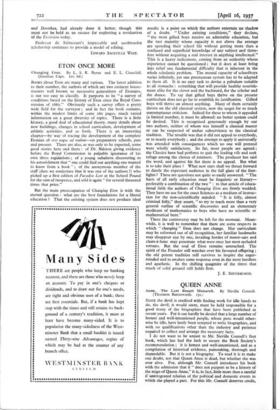ETON ONCE MORE
BOOKS about Eton are many and various. The latest addition to their number, the authors of which are two eminent house- masters well known to successive generations of Etonians, is not too easy to classify. It purports to be " a survey of conditions based on the history of Eton since the Royal Com- mission of 1862." Obviously such a survey offers a pretty wide field for the surveyor ; and in fact the book contains, within the modest limits of some 26o pages, much varied information on a great diversity of topics. There is a little history, a good deal of educational theory, many details about new buildings, changes in school curriculum, development of athletic activities, and so forth. There is an interesting chapter—by way of tracing the development of the complete Etonian ab cruo usque ad malum—on preparatory schools, past and present. There are also, as was only to be expected, some good stories here and there : of Dr. Balston giving evidence before the Royal Commission in palpable ignorance of his own dress regulations ; of a young subaltern discovering to his astonishment that " one could find out anything one wanted to know from a book " ; of the anonymous member of the staff (dare we conjecture that it was one of the authors ?) who picked up a first edition of Paradise Lost at the School Pound for the sum of twopence, and sold it again " for several thousand times that price."
But the main preoccupation of Changing Eton is with the eternal question : what are the best foundations for a liberal education ? That the existing system does not produce ideal results is a point on which the authors entertain no shadow of. A doubt. " Under existing conditions," they declare, " the most gifted boys receive an admirable education, but the vast majority whose capacity is not above the average are spending their school life without getting more than a confused and superficial knowledge of any subject and there-. fore without acquiring a real interest in- anything intellectual." This is a heavy indictment, coming from an authority whose experience cannot be questioned ; but it does at least bring into relief one fundamental difficulty that is inherent in the whole scholastic problem. The mental capacity of schoolboys varies infinitely, yet one procrustean system has to be adapted to them all. It is no easy_ task to devise a pabulum suitable to all stomachs : something that will provide healthy nourish- ment alike for the clever and the backward, for the scholar and the dunce. To say that gifted boys thrive on the present curriculum does not go far to establish its justification. Gifted boys will thrive on almost anything. Many of them certainly throve on the old classical system, now the target for so much contemptuous criticism. Indeed for those to whom it appealed (a limited number, it must be allowed) no better system could be desired. This is recognised- generously enough by our
two authors, neither of whom was himself a classical master or can be suspected of undue subservience to the classical tradition. The trouble was that it did not appeal to everybody, or to nearly everybody ; and the attempt to apply it universally was attended with consequences which no one will pretend were wholly satisfactory. So far, most people are agreed ; the Classics have had perforce to quit the leading role and seek refuge among the chorus of retainers. The producer has said the word, and against his fiat there is no appeal. But what is to take their place ? What new stars shall we thrust forward to, dazzle the expectant audience in the full glare of the foot- lights? These are questions not quite so easily answered. "The basis of all early education must be linguistic or literary— preferably a combination of the two " : to that article of educa- tional faith the authors of Changing Eton are firmly wedded. They have no use for the exact Sciences as a medium of instruc- tion for the non-scientifically minded. " It is folly, almost criminal folly," they assert, " to try to teach more than a very general outline of scientific discoveries and an elementary modicum of mathematics to boys who have no scientific or mathematical bent."
There the controversy may be left for the moment. Mean- while, it is well to remember that there are some respects in which " changing" Eton does not change. Her curriculum may be reformed out of all recognition, her familiar landmarks may disappear one by one, invading hordes of motor-cars and chars-a-bane may penetrate what were once her most secluded retreats. But the soul of Eton remains untouched. The spirit of the Founder still watches over his favoured offspring ; the old potent tradition still survives to inspire the eager- minded and to awaken some response even in the most heedless and apathetic. In the shifting quagmire of the times that much of solid ground still holds firm.
J. E. SHUCKBURGH.






















































 Previous page
Previous page